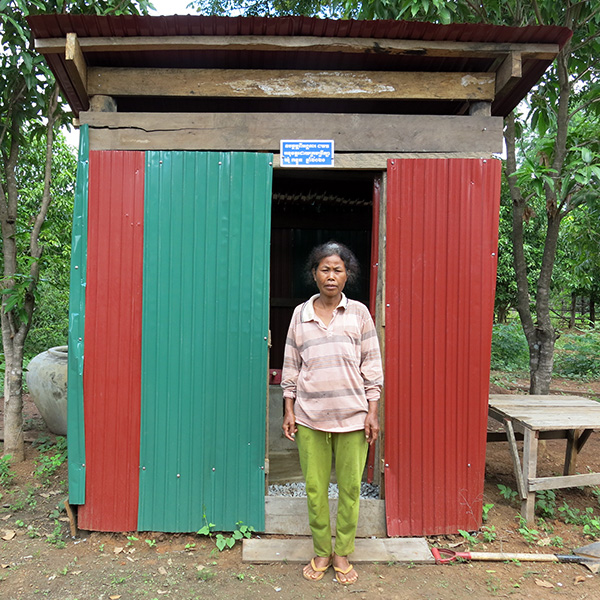Stories of Change

Nen in front of her family's new latrine.
Bathrooms, better health and easier financial burdens in Cambodia
Kong Nen works hard to provide for her family. She’s a widow raising three sons between the ages of 5 and 15 years old. Because she doesn’t own any land, Nen works as a day laborer in her community in northern Cambodia. Unfortunately, it often hasn’t been enough.
Nen’s oldest son dropped out of school to help support his mom and siblings. Like his mom, he works as a day laborer. Together, they can earn about $7 per day. Nen’s younger sons never had the opportunity to go to school–the family couldn’t afford uniforms, transportation, supplies and other school fees.
The CWS team in Cambodia got to know Nen earlier this year. She told us about her family’s struggles, and we knew we could help. We know from working with thousands of other families that there is often a strong link between sanitation and household finances. If families aren’t able to protect their health with infrastructure like clean water systems or sanitary latrines, they will inevitably spend more money on health clinic visits and medicine. The more money that goes to treating water-borne or other preventable illness, the less there is available for other expenses…including education.
We invited Nen to join a community information session on water, sanitation and hygiene. She learned about water treatment options, personal hygiene and environmental sanitation. She learned about the health hazards of using fields and streams as bathrooms, which is what Nen and her sons had been doing because they couldn’t afford to build a bathroom. After the education session, CWS also provided support so that Nen could afford to build that new bathroom.
“My family is poor, so we could never afford to have our own sanitary latrine,” Nen told us. “I am so happy for the support to have one now. It is so convenient for us to have and use our own toilet; before, my family and I used the open field, which meant that the surrounding environment wasn’t good and the area smelled bad.”
She added that, “we now see that the latrine is really important for us. Now we are living in a clean environment, we understand and practice good hygiene, and as a result our health is now much better. We rarely get sick, so we don’t spend much on health treatment, unlike before, which significantly helps to reduce our financial burden. So, thank you so much to CWS for the support.”
